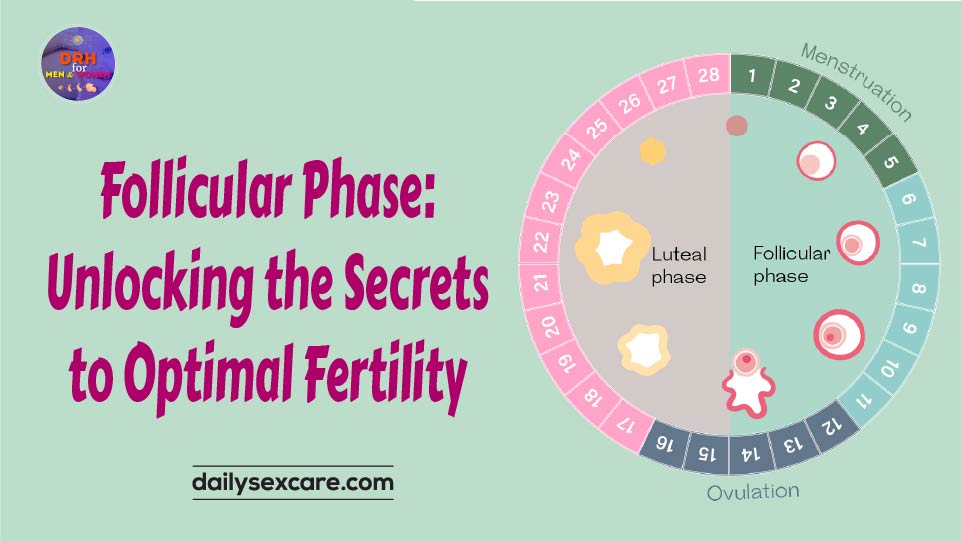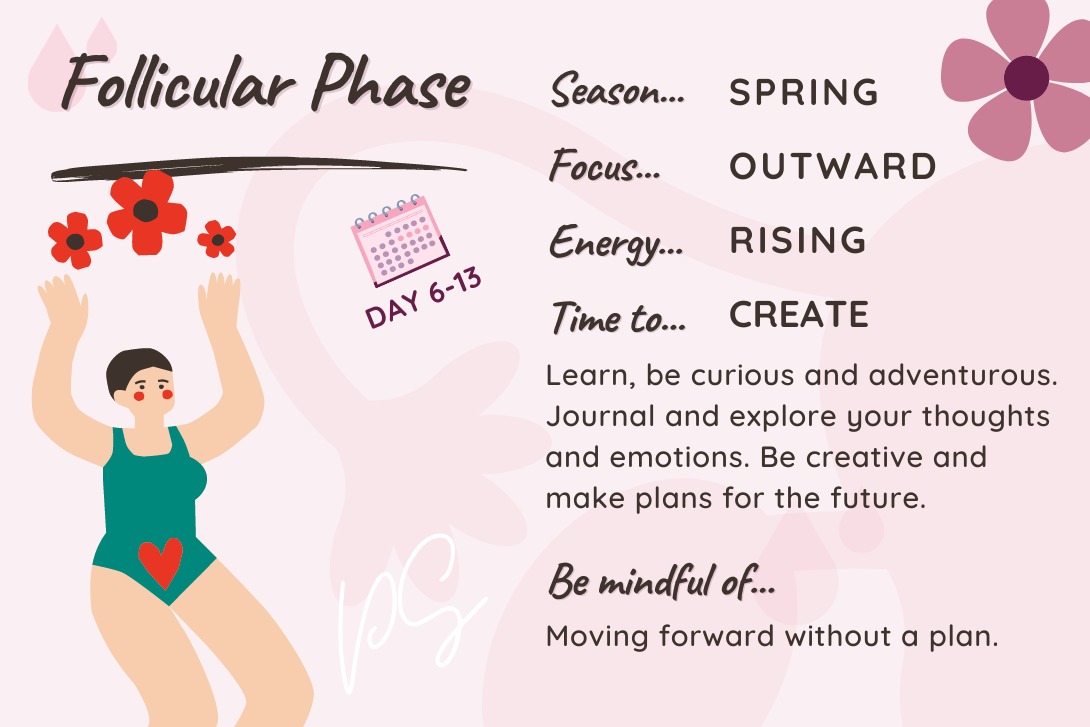
The follicular phase is the first half of the menstrual cycle, starting on the first day of menstruation. It ends with ovulation.
The follicular phase typically lasts about 14 days but can vary between women. During this phase, the pituitary gland releases follicle-stimulating hormone (FSH). FSH stimulates the growth of ovarian follicles, which each contain an egg. As follicles mature, they produce estrogen, which thickens the uterine lining.
A thickened lining prepares the uterus for potential pregnancy. Higher estrogen levels also trigger the release of luteinizing hormone (LH). LH surge leads to ovulation, marking the end of the follicular phase. Understanding this phase is crucial for fertility awareness and menstrual health.

Credit: periodshop.com.au
Follicular Phase Basics
The follicular phase is the first part of the menstrual cycle. It plays a key role in a woman’s reproductive health. Understanding this phase helps in tracking fertility and menstrual health.
Cycle Overview
The follicular phase starts on the first day of menstruation. It ends with ovulation. This phase usually lasts about 14 days. The length can vary between women.
During this phase, the body prepares for a possible pregnancy. The pituitary gland releases a hormone called FSH (Follicle Stimulating Hormone). FSH stimulates the ovaries to produce follicles. Each follicle contains an egg.
| Day of Cycle | Event |
|---|---|
| 1 | First day of menstruation |
| 1-14 | FSH stimulates follicle growth |
| 14 | Ovulation occurs |
Role In Fertility
The follicular phase is crucial for fertility. Growing follicles produce estrogen. Estrogen thickens the uterine lining. This makes it ready for a possible pregnancy.
When estrogen levels peak, the body releases LH (Luteinizing Hormone). LH triggers ovulation. The most mature follicle releases its egg. This egg travels down the fallopian tube. It waits to be fertilized by sperm.
The health of the follicles affects fertility. Healthy follicles lead to a strong ovulation. This increases the chances of conception.
- FSH stimulates follicle growth
- Follicles produce estrogen
- Estrogen thickens the uterine lining
- LH triggers ovulation
Tracking the follicular phase can help in family planning. It can also help detect any reproductive health issues early.
Hormonal Changes
The follicular phase is a crucial part of the menstrual cycle. This phase is marked by significant hormonal changes. Understanding these changes helps in grasping the overall menstrual cycle.
Estrogen Surge
During the follicular phase, the hormone estrogen levels rise. This rise is necessary for the maturation of the ovarian follicles. Estrogen prepares the body for ovulation.
High levels of estrogen also help thicken the uterine lining. This thickening is essential for potential embryo implantation. Estrogen levels peak just before ovulation.
FSH Levels
Follicle-stimulating hormone (FSH) is another critical hormone. FSH stimulates the growth of ovarian follicles. These follicles contain the eggs that may be released during ovulation.
FSH levels are highest at the beginning of the follicular phase. As estrogen levels rise, FSH levels decrease. This balance is crucial for a healthy menstrual cycle.
| Hormone | Role | Phase |
|---|---|---|
| Estrogen | Thickens uterine lining | Follicular Phase |
| FSH | Stimulates follicle growth | Follicular Phase |
Both hormones, estrogen and FSH, play pivotal roles. They ensure the smooth progression of the follicular phase. Understanding these roles can provide insights into menstrual health.
Follicle Development
The Follicular Phase is a crucial part of the menstrual cycle. During this time, follicle development occurs in the ovaries. Understanding this process helps you grasp how the body prepares for ovulation.
Growth Stages
Follicle development involves several growth stages. Each follicle starts as a primordial follicle. These are tiny and inactive. They then progress to primary follicles. At this stage, they grow larger and start to mature.
Next, they become secondary follicles. These follicles continue to grow and develop further. Finally, they transform into tertiary follicles, also known as antral follicles. These follicles contain a fluid-filled cavity.
| Stage | Description |
|---|---|
| Primordial Follicle | Small, inactive |
| Primary Follicle | Starts growing |
| Secondary Follicle | Continues to mature |
| Tertiary Follicle | Contains fluid-filled cavity |
Dominant Follicle
Among the tertiary follicles, one becomes the dominant follicle. This follicle grows faster than the others. It reaches maturity and is ready for ovulation. The dominant follicle will release an egg during ovulation.
Other follicles will stop growing and eventually break down. The dominant follicle ensures a single, healthy egg is released. This process is vital for fertility and the menstrual cycle.
- Primordial Follicle: Small, inactive
- Primary Follicle: Starts growing
- Secondary Follicle: Continues to mature
- Tertiary Follicle: Contains fluid-filled cavity
Signs And Symptoms
The follicular phase is an important part of the menstrual cycle. It starts right after menstruation and prepares the body for ovulation. Understanding its signs and symptoms helps you track your cycle better.
Physical Indicators
During the follicular phase, several physical changes occur in the body:
- Cervical Mucus: Increases in volume and becomes clear and stretchy.
- Basal Body Temperature: Stays relatively low compared to the luteal phase.
- Breast Tenderness: May experience mild tenderness or changes in breast texture.
- Increased Energy Levels: Feel more energetic and active.
- Skin Changes: Skin may look clearer and more radiant.
Emotional Changes
Emotionally, the follicular phase brings about various changes:
- Mood Improvement: Feel happier and more positive.
- Increased Libido: Experience a higher sex drive.
- Better Focus: Concentrate more easily and think clearly.
- Motivation Surge: Feel more motivated to take on new tasks.
Tracking these signs and symptoms can help you understand your body better. It also aids in planning activities around your cycle for optimal performance.
Diet And Nutrition
The follicular phase starts right after menstruation and lasts until ovulation. During this phase, your body prepares an egg for release. A balanced diet can support this process. Let’s dive into the essentials of diet and nutrition during the follicular phase.
Essential Nutrients
During the follicular phase, specific nutrients can support hormone balance and egg development. Here are some essential nutrients:
- Folate: Supports cell division and egg quality.
- Iron: Replenishes iron lost during menstruation.
- Vitamin C: Boosts immune function and supports iron absorption.
- Omega-3 Fatty Acids: Reduces inflammation and supports hormone production.
- Protein: Provides building blocks for cell growth and repair.
Foods To Include
Incorporating certain foods can help you get the essential nutrients needed during the follicular phase. Below are some foods to include:
| Food | Nutrient |
|---|---|
| Spinach | Folate, Iron |
| Oranges | Vitamin C |
| Salmon | Omega-3 Fatty Acids |
| Chicken | Protein |
| Chia Seeds | Omega-3 Fatty Acids, Protein |
Including these foods in your diet can support your body during the follicular phase. Try to create balanced meals with these ingredients.
Exercise And Activity
The follicular phase is the first half of your menstrual cycle. It begins on the first day of your period and ends with ovulation. During this phase, your body prepares for a potential pregnancy. Exercise and activity play a crucial role in this phase. They help regulate hormones and enhance overall well-being.
Recommended Exercises
In the follicular phase, choose exercises that boost energy and mood. Here are some excellent options:
- Cardio Workouts: Activities like running, cycling, and swimming are great. They increase stamina and improve cardiovascular health.
- Strength Training: Light to moderate weight lifting helps build muscle and strength.
- Yoga: Poses like Sun Salutations enhance flexibility and reduce stress.
- Pilates: This helps strengthen the core and improve posture.
Impact On Ovulation
Exercise influences hormone levels that regulate ovulation. Here are some key impacts:
| Type of Exercise | Impact on Ovulation |
|---|---|
| Moderate Exercise | Promotes regular ovulation and hormonal balance. |
| High-Intensity Exercise | May delay ovulation if overdone. |
| Light Exercise | Minimal impact, good for maintaining activity levels. |
Regular moderate exercise is key for a healthy menstrual cycle. Avoid excessive high-intensity workouts. They may disrupt your cycle. Balance is essential for maintaining overall health.

Stress Management
The follicular phase is a crucial part of the menstrual cycle. Managing stress during this phase can help maintain hormonal balance. Let’s explore some effective stress management techniques.
Relaxation Techniques
Relaxation techniques can significantly reduce stress. Consider these methods:
- Deep Breathing: Take slow, deep breaths to calm your mind.
- Progressive Muscle Relaxation: Tense and relax different muscle groups.
- Visualization: Imagine a peaceful scene to feel relaxed.
- Yoga: Practice gentle yoga poses to ease tension.
Regular practice of these techniques can improve your overall well-being.
Mindfulness Practices
Mindfulness practices help you stay present and focused. They can reduce stress effectively. Here are some simple practices:
- Meditation: Sit quietly and focus on your breath.
- Body Scan: Pay attention to different parts of your body.
- Mindful Eating: Eat slowly and savor each bite.
- Gratitude Journaling: Write down things you are grateful for.
Incorporating these practices can foster a sense of calm and clarity.
| Technique | Benefits |
|---|---|
| Deep Breathing | Reduces anxiety and lowers blood pressure |
| Progressive Muscle Relaxation | Relieves physical tension and stress |
| Visualization | Promotes mental relaxation and peace |
| Yoga | Enhances flexibility and reduces stress |
Tracking Your Cycle
The follicular phase is a vital part of the menstrual cycle. Understanding this phase can help in managing health and wellness. Tracking your cycle is essential for knowing your body’s patterns. It can aid in planning and improving overall health.
Tools And Apps
Several tools and apps can help track your menstrual cycle. These tools are user-friendly and offer many features. Some popular apps include:
- Clue
- Flo
- Ovia
- Glow
Each app has unique features. For example, Clue allows tracking of moods and symptoms. Flo offers insights into fertility and pregnancy. Ovia provides health tips and Glow connects users with a community.
| App | Features |
|---|---|
| Clue | Tracks moods, symptoms, and cycle length |
| Flo | Fertility insights, pregnancy tracking |
| Ovia | Health tips, symptom tracking |
| Glow | Community support, health tracking |

Credit: elara.care
Benefits Of Tracking
Tracking your cycle offers many benefits. It helps in predicting periods and ovulation. This knowledge aids in family planning and understanding fertility windows.
Tracking can also identify irregularities in the cycle. Early detection of issues can lead to timely medical consultation. It helps in managing symptoms like cramps and mood swings. Knowing the cycle helps in planning activities and managing stress.
Overall, tracking your cycle can enhance your well-being and empower you with knowledge about your body.
Medical Interventions
The follicular phase is a crucial part of the menstrual cycle. Sometimes, women may need medical help to regulate this phase. Medical interventions can assist with ovulation and improve fertility.
Fertility Medications
Doctors often prescribe fertility medications to stimulate ovulation during the follicular phase. These drugs can help the ovaries produce multiple eggs. Common fertility medications include:
- Clomiphene Citrate (Clomid): Helps stimulate ovulation.
- Gonadotropins: Hormones that stimulate the ovaries.
- Letrozole (Femara): Often used for women with PCOS.
These medications can increase the chances of pregnancy. They are usually taken under the supervision of a fertility specialist.
When To Seek Help
It is essential to know when to seek help. Women who have irregular periods or trouble conceiving might need medical advice. Here are some signs that indicate you should consult a doctor:
| Signs | Details |
|---|---|
| Irregular Periods | Periods that are too short, too long, or unpredictable. |
| No Periods | Not having a period for several months. |
| Failed Attempts | Trying to conceive for over a year without success. |
If you notice these signs, it may be time to consult a fertility specialist. Early intervention can significantly improve your chances of conception.
Lifestyle Adjustments
The follicular phase is a crucial part of a woman’s menstrual cycle. Lifestyle adjustments can significantly impact this phase. Making mindful choices can optimize hormone balance and overall health.
Sleep Patterns
Quality sleep is essential during the follicular phase. Aim for 7-9 hours of sleep each night. Consistent sleep patterns help regulate hormones.
- Go to bed and wake up at the same time daily.
- Avoid screens at least one hour before bedtime.
- Create a relaxing bedtime routine.
- Ensure your bedroom is dark and cool.
Avoiding Toxins
Avoiding toxins is vital for hormonal balance. Reduce exposure to harmful chemicals found in everyday products.
| Type of Product | Harmful Chemicals | Safer Alternatives |
|---|---|---|
| Cleaning Products | Phthalates, Triclosan | Vinegar, Baking Soda |
| Personal Care Items | Parabens, Sulfates | Organic Brands |
| Plastics | BPA, PVC | Glass, Stainless Steel |
Eating organic foods can also reduce toxin intake. Choose organic fruits and vegetables to limit pesticide exposure.
By making these lifestyle adjustments, women can support their follicular phase naturally.
Partner Involvement
The follicular phase is a crucial time in the menstrual cycle. Partner involvement can make a big difference. It strengthens the bond and provides emotional support.
Communication Tips
Talking helps both partners understand the changes happening. Here are some tips for better communication:
- Be open about feelings and symptoms.
- Use simple language to explain changes.
- Listen actively to each other.
Active listening means giving full attention. It shows you care. This builds trust and understanding.
Shared Responsibilities
Sharing tasks can reduce stress during the follicular phase. Here are some ways to share responsibilities:
| Task | Partner Involvement |
|---|---|
| Meal Preparation | Cooking healthy meals together. |
| Exercise | Going for walks or doing yoga together. |
| Household Chores | Splitting chores to ease the load. |
Teamwork makes the process smoother. It helps in creating a supportive environment.

Alternative Therapies
The follicular phase of the menstrual cycle can be enhanced with alternative therapies. These treatments offer natural ways to support reproductive health. Below are some popular options to consider.
Acupuncture Benefits
Acupuncture has been used for centuries to aid in various health conditions. For women, it can help regulate the menstrual cycle.
- Improves blood flow to the ovaries
- Reduces stress and anxiety levels
- Balances hormone levels
Regular sessions can optimize the follicular phase. Studies show that acupuncture can improve fertility outcomes. It works by releasing endorphins, which are natural pain relievers.
Herbal Remedies
Many herbal remedies can support the follicular phase. These herbs are known for their beneficial properties:
| Herb | Benefit |
|---|---|
| Vitex | Balances hormones |
| Red Raspberry Leaf | Strengthens uterine lining |
| Maca Root | Boosts energy and fertility |
Using these herbs can naturally support your cycle. Always consult a healthcare provider before starting any new herbal remedy. This ensures safety and effectiveness.
Common Myths
The follicular phase of the menstrual cycle is often misunderstood. Many myths surround this crucial phase, leading to confusion. Let’s explore and debunk these misconceptions with scientific facts.
Debunking Misconceptions
There are several myths about the follicular phase. Here are some common ones:
- Myth: The follicular phase is the same for all women.
- Myth: Women cannot get pregnant during the follicular phase.
- Myth: Hormonal changes only happen during menstruation.
Scientific Facts
Understanding the truth about the follicular phase is important. Here are the facts:
| Myth | Fact |
|---|---|
| The follicular phase is the same for all women. | The follicular phase can vary in length. |
| Women cannot get pregnant during the follicular phase. | Ovulation can occur, leading to pregnancy. |
| Hormonal changes only happen during menstruation. | Hormones fluctuate throughout the follicular phase. |
These facts highlight the complexity and importance of the follicular phase. It is essential to understand these nuances for better health and well-being.
Success Stories
The follicular phase is a crucial part of the menstrual cycle. Many women have seen significant improvements in their health by understanding and optimizing this phase. Here, we share inspiring success stories from women who have successfully navigated their follicular phase.
Personal Experiences
Jane’s Journey: Jane struggled with irregular cycles for years. She started tracking her follicular phase. By eating a balanced diet and practicing yoga, she saw improvements. Her cycles became more regular, and her energy levels increased.
Mary’s Transformation: Mary faced severe PMS symptoms. She educated herself about the follicular phase. She began incorporating more leafy greens and lean proteins into her diet. Her PMS symptoms reduced drastically, and she felt more in control of her body.
| Person | Challenge | Solution | Result |
|---|---|---|---|
| Jane | Irregular Cycles | Balanced Diet, Yoga | Regular Cycles, Increased Energy |
| Mary | Severe PMS | Leafy Greens, Lean Proteins | Reduced PMS, More Control |
Lessons Learned
- Track Your Cycle: Keeping a journal helps identify patterns.
- Nutrition Matters: A balanced diet can improve cycle regularity.
- Exercise Benefits: Regular physical activity boosts energy and mood.
Key Takeaways:
- Understanding the follicular phase can lead to better health outcomes.
- Simple lifestyle changes can make a big difference.
- Personal experiences highlight the importance of listening to your body.
Future Research
The Follicular Phase is essential for understanding women’s reproductive health. Ongoing research continues to uncover new insights. This section explores emerging studies and potential innovations in this field.
Emerging Studies
Recent studies have focused on hormonal changes during the follicular phase. These studies aim to identify patterns and anomalies that affect fertility. Researchers use advanced imaging and molecular techniques. This enables a better understanding of ovarian follicle development.
A study published in the Journal of Reproductive Medicine highlighted how stress impacts the follicular phase. The study used cortisol levels as a biomarker. Results showed that high stress levels can delay ovulation. This has significant implications for women trying to conceive.
| Study | Focus | Key Findings |
|---|---|---|
| Hormonal Changes | Follicle Development | Identified key hormonal triggers |
| Stress Impact | Cortisol Levels | High stress delays ovulation |
Potential Innovations
Innovations in technology are opening new doors for follicular phase research. Wearable tech can track hormonal changes in real-time. This provides valuable data for both researchers and users. These devices can predict ovulation with greater accuracy.
Artificial Intelligence (AI) is another promising tool. AI algorithms analyze large datasets to find patterns. This can help in identifying early signs of fertility issues. AI can also assist in personalized treatment plans, improving success rates.
- Wearable Tech: Real-time hormone tracking
- AI Algorithms: Data analysis and pattern recognition
- Personalized Treatment: Customized plans for better outcomes
The future of follicular phase research looks promising. With new technologies, we can expect more accurate and personalized fertility treatments. Stay tuned for more updates in this exciting field.

Credit: naturalwomanhood.org
Frequently Asked Questions
What Happens During My Follicular Phase?
During the follicular phase, your body prepares for ovulation. Estrogen levels rise, stimulating egg follicle growth. The uterine lining thickens, readying for potential pregnancy. This phase lasts about 14 days.
What Is Follicular Vs Luteal Phase?
The follicular phase occurs from the first day of menstruation to ovulation. The luteal phase follows, lasting until the next period.
Can I Get Pregnant During The Follicular Phase?
Yes, pregnancy during the follicular phase is possible but rare. Ovulation usually occurs later in the cycle.
What Is The Dominant Hormone In The Follicular Phase?
The dominant hormone in the follicular phase is estrogen. Estrogen stimulates follicle development in the ovaries.
Conclusion
Understanding the follicular phase is crucial for tracking your menstrual cycle. It helps in planning and improving reproductive health. By recognizing its signs, you can better manage your health and fertility. Stay informed and consult healthcare professionals for personalized advice.
Your knowledge empowers you to make better health decisions.
 Reproductive Health Sexual and Reproductive Health
Reproductive Health Sexual and Reproductive Health






